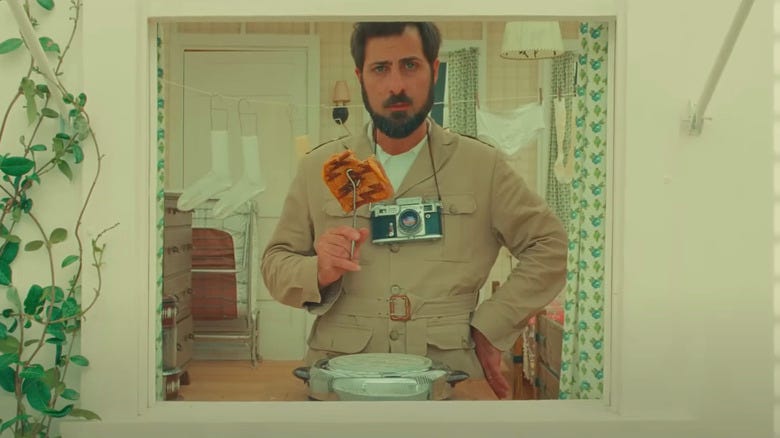Disclosure: This isn’t an exact facsimile of what I wrote to my family. It’s been enhanced in certain places to make it more palatable to a general audience. This article is also on my Patreon and my Medium.

Dear my entire extended family. When I mentioned that my favorite film of the year was Asteroid City (although, to be fair, I greatly enjoyed Tetris, Killers of the Flower Moon, Holdovers, Fool’s Paradise, and Oppenheim), I’m flattered that you all took it as a recommendation but I would have told you he has a very stylized way of making films.
Asteroid City is by Wes Anderson who has a very stylized way of making films. He started out in the 1990s with low budget movies (Bottle Rocket, Rushmore) and just a few characters. These were probably not that out of step with regular movies and would have been more palatable to you. Martin Scorsese and James L Brooks were very strong early champions of his work.
Royal Tenenbaums is probably his most effective piece emotionally. It involves a dying elderly man (Gene Hackman) trying to connect with his wife (Anjelica Huston) and adult kids before he goes. The kids are all accomplished geniuses in their field, but they are beset by loneliness and intimacy and are even romantically entangled.
Ed Norton was asked why his favorite director was Wes Anderson and he said that it spoke to people’s need to belong. That’s why he’s maybe my favorite director as well. The characters might be enemies in the middle of or whatever, but they ultimately recognize each other’s humanity at the end. I would also say that for unmarried people, Wes Anderson provides a comfort because he leans so heavily on found family tropes, and not the belief that happy endings are based on romantic ones.
From there, his works have gotten more idiosyncratic with more bloated casts. This, I suspect, might be the turn off to regular moviegoers. If there are 40 speaking roles, it’s harder to form a coherent story.
It’s probably this kind of stuff that has made him fodder for humor. Amy Poehler once joked at the Golden Globes that he rode to the ceremony on a bicycle made from tuba parts. SNL did a skit on him. So if you want to just laugh at him, check this video out:
But isn’t this normal for all our favorite directors? Don’t you lean into the stuff that hits for you and your fans?
What I’m essentially saying is sometimes you have to grow up with a director. Can you appreciate John Ford’s The Searchers (a film where he humanizes the Indians) without seeing films where he painted Indians as flat characters.
I also like Asteroid City because he had worked with such bloated casts and he corrected the problem. His worst example of this was the previous film, The French Dispatch. In this film, he has a ton of actors as well, BUT the key to appreciating the film, is that only five characters matter. The Tom Hanks character, the Jason Schwartzman character, Scarlett Johannson, and the two respective children of J.S. and Scar-Jo (Technically, Schwartzman’s character has more than one kid, but the others aren’t really important, and Wes Anderson smartly doesn’t give them many lines so they’re not a distraction). The three adults have different ways of living and dealing with loss, and the two children are the hope that the future could be unencumbered by that loss. Everyone else in the movie is just window dressing: They’re just flashes of color and texture that Wes Anderson uses really well.
Then there’s the play behind the story (the part with Bryan Cranston, Willem DaFoe, Ed Norton, and Adrien Brody fall into this). Some might call it extra and unnecessary, and some might see it an extra layer of genius. I’ll even give you all that point: It’s excessive, EXCEPT for one thing. It lends credence to the visual artificiality. TV Tropes (A favorite site of mine, here is their entry) mentions that the geography of the town doesn’t make sense. It’s mostly an excuse to use the stock desert interstate. There are a lot of easter eggs like that. It’s a way of more clearly illustrating that the film maker is a product of his influences (Tennessee Williams, Rod Sterling, and Elia Kazan are influences for the play behind the play).
This movie might not be an easy, breezy watch. However, it is a film that leaves you thinking (provided you watch it to the end).

For example, what’s the reality of the scene when Jason Schwartzman’s character burns his hand? Both he and Scar-Jo react not as characters but as actors who are taken out of the moment because something went wrong on set. Is this commentary on the film’s artifice or part of a deeper meaning? Perhaps, it reflects how a parent might have to be performative to help their kids cope with loss? It's the kind of thing that a think piece like this can be written about.
Even if you didn’t love it, I’m proud of my recommendation because it’s a lesson that films don’t all come in the same form and they entertain in different ways. Sometimes, if you expand yourselves out of your comfort zone, you will be rewarded with a richer experience.
No comments:
Post a Comment